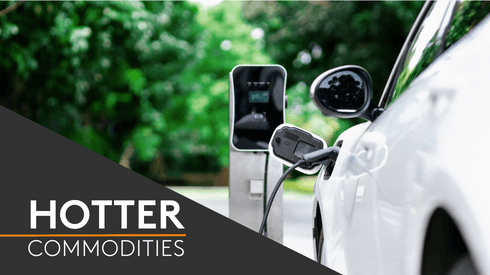Prices were also buoyed by the rise in lithium carbonate futures prices on the Guangzhou Futures Exchange (GFEX) futures over the past week. But the futures market closed down on November 6, which some sources attributed to the US election results.
“The GFEX fell in the last half an hour before today’s close, due to [President-elect] Donald Trump’s election win, which has dampened market sentiment. Our bids to spodumene also fell following GFEX across the day,” one Asia-based trader said.
Fastmarkets’ daily assessment of the spodumene, 6% Li2O min, spot price, cif China, was $760-820 per tonne on Wednesday, widening upward by $10 per tonne from $750-810 per tonne on Tuesday November 5 and up from $730-760 per tonne on October 25.
The most active 2501 (January) lithium carbonate futures contract on GFEX closed at 75,900 yuan ($10,679) per tonne on Wednesday, after it bottomed at 74,750 yuan per tonne earlier in the day. The contract had opened at 77,500 yuan per tonne on Wednesday.
Market reaction to US election results
Early reactions on the US election result were mixed, but broadly bearish for the lithium and spodumene industries.
“Trump’s policies will focus more on traditional energy sources, such as oil, coal and gas. Trump is not a fan of renewable resources, so we think the result is bearish for the markets,” one producer said.
But a Singapore-based trader said, “I haven’t seen any downward pressure on spodumene prices yet after GFEX decline and Trump’s election.”
“I don’t think policy was ever going to drive a huge adoption rate [of electric vehicles] in the US, no matter what the result was,” one US-based trader said. “So, domestically, I don’t think [the election result] will be particularly eventful [for the spodumene and lithium markets].”
Chandler Wu, Fastmarkets’ battery raw materials senior analyst, said the key issues around the US elections results for the lithium industry center around tariffs and resource independence.
“Trump was elected to be the next US president, which might affect the speed of [electrification], as Trump is more supportive of traditional energy like oil and gas compared with [Vice President] Kamala Harris. This might limit investment or cut subsidies to the lithium battery and new energy vehicles sectors,” Wu said. “Meanwhile, the ‘trade war’ between China and US might get more serious. ‘America First’ is always the attitude of Trump, so resource independence to some extent from China or South America might be an option during his political tenure.”
“But even though more tariff barriers are expected in Trump’s second term, we have witnessed many corporations in the EV supply chain transferring from exporting products to exporting supply chains to avoid tariffs, so any additional tariff might have less impact on more globalized companies,” he said.
Market inventories lowering, restocking emerges
Spodumene prices have also been affected by a recent surge in demand, driven by Chinese lithium producers looking to restock.
“Many Chinese lithium producers were running production based on the orders they got in previous months because of weak lithium demand and thin margins. Therefore, they do not have much inventory now,” a source at an Australian spodumene producer said.
Recent cathode production expectations in China for November have increased from earlier estimates, which has also contributed to the rise in demand for lithium, and, in turn, for spodumene, sources said.
“November’s cathode production in China is not as bad as expected, but also not much better. Even with the slightest improvement of the demand though, the supply from the Chinese lithium producers couldn’t keep up.”
Market inventories are mostly held in GFEX warehouses or by traders. But some major Chinese cathode and battery makers prefer to purchase directly from lithium producers, as the consumers can guarantee the lithium salts specification meet their requirement, sources told Fastmarkets.
The market reports availability of spodumene is adequate for the uptick in demand, but some sources said the difference in buyer and seller price ideas were stalling sales. And one source said that the demand picture has not changed enough to warrant the rise in spodumene offer levels.
“The market is not short of spodumene, but cheap spodumene,” another Asia-based trader said.
“The sellers are generally offering spot spodumene at above $800 per tonne. But there is consumer resistance, given that there’s no significant improvement of lithium demand,” a lithium consumer said.
Gain a competitive edge with our spodumene prices. Talk to us about our market-reflective spodumene prices, data and analysis




